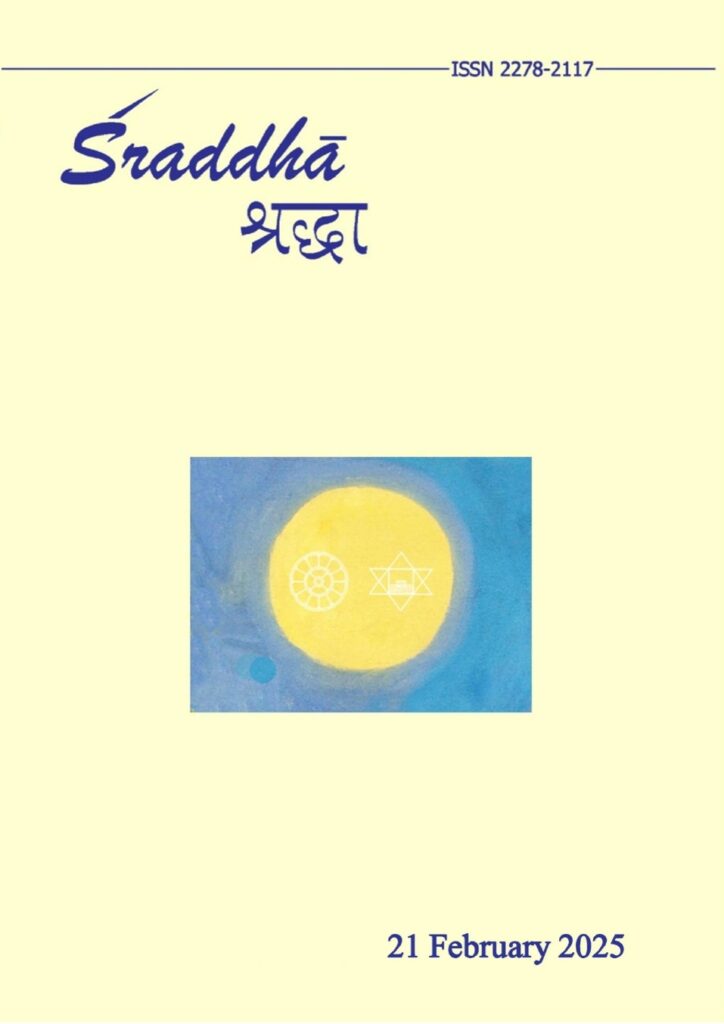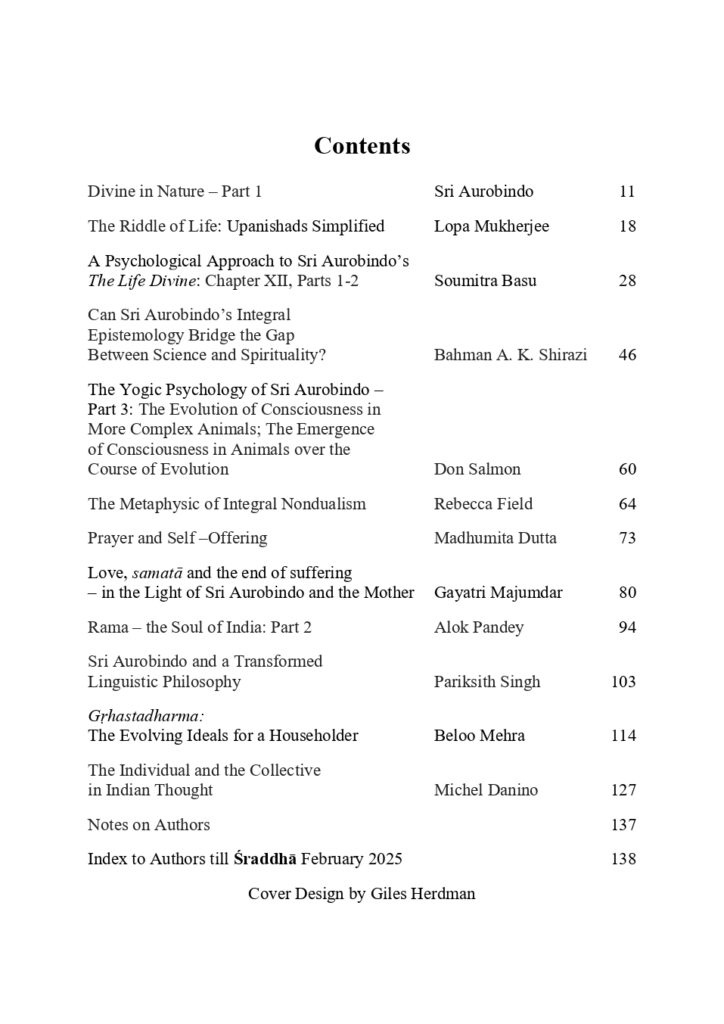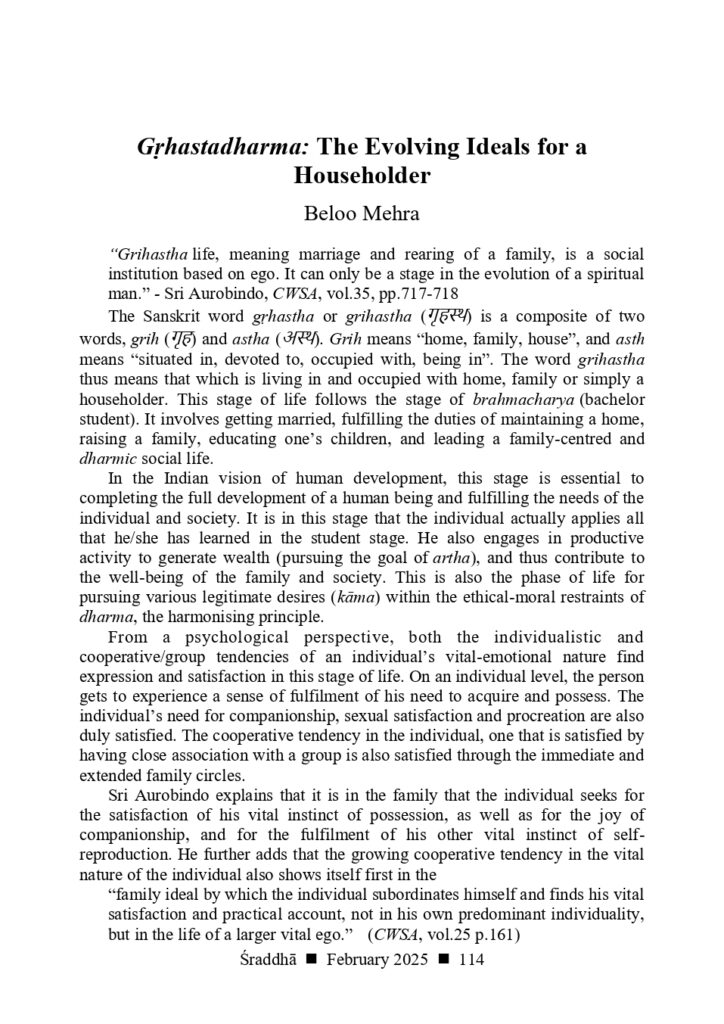Author: Beloo Mehra
Journal: Śraddhā
Date of Publication: February 2025
A new article by Dr. Beloo Mehra was recently published in Śraddhā, Vol.16 No.3. This joournal is pubished by Sri Aurobindo Centre for Research in Social Sciences, Sri Aurobindo Bhavan, Kolkata.


Gṛhasthadharma: The Evolving Ideals for a Householder
EXCERPT FROM THE ARTICLE
“Grihastha life, meaning marriage and rearing of a family, is a social institution based on ego. It can only be a stage in the evolution of a spiritual man.”
~ Sri Aurobindo, CWSA, Vol. 35, pp. 717-718
The Sanskrit word gṛhastha or grihastha (गृहस्थ) is a composite of two words, grih (गृह) and astha (अस्थ). Grih means “home, family, house”, and asth means “situated in, devoted to, occupied with, being in”. The word grihastha thus means that which is living in and occupied with home, family or simply a householder. This stage of life follows the stage of brahmacharya (bachelor student). It involves getting married, fulfilling the duties of maintaining a home, raising a family, educating one’s children, and leading a family-centered and dharmic social life.
In the Indian vision of human development, this stage is essential to completing the full development of a human being and fulfilling the needs of the individual and society. It is in this stage that the individual actually applies all that he/she has learned in the student stage. He also engages in productive activity to generate wealth (pursuing the goal of artha), and thus contribute to the well-being of the family and society. This is also the phase of life for pursuing various legitimate desires (kāma) within the ethical-moral restraints of dharma, the harmonizing principle.
From a psychological perspective, both the individualistic and cooperative/group tendencies of an individual’s vital-emotional nature find expression and satisfaction in this stage of life. On an individual level, the person gets to experience a sense of fulfillment of his need to acquire and possess. The individual’s need for companionship, sexual satisfaction and procreation are also duly satisfied. The cooperative tendency in the individual, one that is satisfied by having close association with a group is also satisfied through the immediate and extended family circles.
Sri Aurobindo explains that it is in the family that the individual seeks for the satisfaction of his vital instinct of possession, as well as for the joy of companionship, and for the fulfilment of his other vital instinct of self-reproduction. He further adds that the growing cooperative tendency in the vital nature of the individual also shows itself first in the “family ideal by which the individual subordinates himself and finds his vital satisfaction and practical account, not in his own predominant individuality, but in the life of a larger vital ego.” (CWSA, Vol. 25, p. 161). Looking at the past we recognise that this family ideal played a great part in the old aristocratic views of life – both in East and the West. To quote again from Sri Aurobindo, this ideal was there “in the ancient Indian idea of the kula and the kuladharma, and in later India it was at the root of the joint-family system which made the strong economic base of mediaeval Hinduism.” (CWSA, Vol. 25, p. 161).

It is also important to note here that as per the Indian cultural tradition, there was also a choice for someone to skip the householder or grihastha stage of life. One could go straight to sannyāsa stage of life, thereby renouncing worldly and materialistic pursuits and dedicating one’s life to spiritual pursuits. This was generally more common for men than women. But the Indian tradition also has plenty of evidence regarding women sages and yoginis who chose this path of renunciation.
